Like my comrade, the illustrious scribe of Bibliodeviant, I will also traipse through a serial recount of *my* first New York ABAA Book Fair in a similar fashion and how the sideshow, that is Lux Mentis, embellishes the landscape of the book trade and book collecting like the carnival we seem to entertain. Inspired, though by the words of Mr. Kearns, I would like to address the idea of bookselling as identity and image briefly.
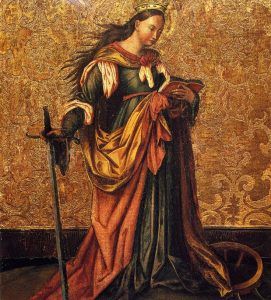
Girl, get a grip
After working over 20 years in library land and visual arts culture, I’ve worn several hats. However, not just one will underscore my identity, which to some I apparently wear openly and ripe for criticism. We can model ourselves in such a way that the world might fantasize about librarians in that perverse and/or cryptic and ‘monkish’ kind of way, or we can shine bright like a diamond* with a freak flag of superb owning up to our singular individuality, our own individual prowess to flourish and thrive in this profession.
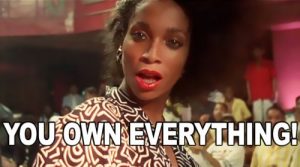
Basically, the same perception applies to hungry, curious, and experienced visitors at your book fair booth, in your house, your library, your bookshops. You never know what they might bring to the table. Same goes for your fellow booksellers. So, regardless if you have marked skin, blue hair, fancy tweeds, tortoise shell glasses or honest awkwardness, we corral a fierce sense of advocacy for printed and written matter that gives these manifestations of glory multi-generational lives that are passed through a series of hands, hearts, and minds. We have the opportunity to support and create libraries, research, passions, and histories for people, otherwise drowning in the mediocrity in the world. We will find success in those connections, rather than in a litany of judgment based on gender, appearance, and other personal identities.
I could further throw a tirade of shade*, but rather, let’s tunnel into the rabbit hole of New York. As others have mentioned, New York is on fire with grit and action, unlike any other metropolitan in the US, however like I mentioned in a previous blog, the city is a hotbed for bibliophilic intellectualism and performative ingenuity. The New York Antiquarian Book Fair is a force and now I know compared to the somewhat laissez-faire attitude of California (as least Pasadena), I understand why it operates as such. The Park Armory building is a gorgeous architectural example of late 19th century Gothic revival design suitably fitting to encase a labyrinthine maze of booksellers. I felt sort of enveloped in a skeletal shell, ironically housing the biblio-madness for the next few days.
Before set-up started on Wednesday, I can’t slide by without saluting a few notable events and people. Through a blizzard (ha!), we made our way through the quiet snow of Massachusetts to the insanely talented home of Michael Kuch, artist, to pick up the latest iteration of work debuting at the fair [images to follow]. We also lavished in the presence of Marvin Taylor and Charlotte Priddle at the Fales Library & Special Collections, NYU where I pawed around the stacks a bit, as well. Lastly, I would be lying if I wasn’t fidgeting like a 3 year old needing to pee, because I was able to see the Mystery and Benevolence exhibit at the American Folk Art Museum. Get your secret handshake on.
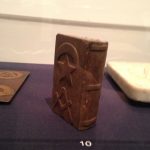
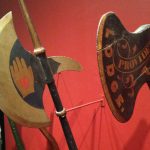
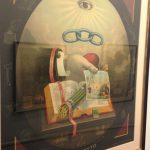
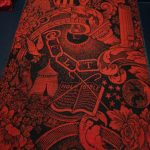
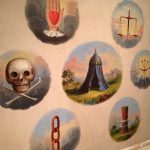
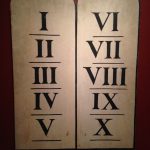
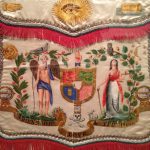
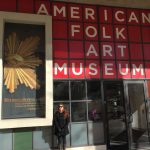
To be continued…[Next up, witness me!*]
*If any of you get my pop culture references, you are Gucci. Yes, I am a metalhead who listens to Ri-Ri.
 The dust has finally settled on the 2009 Boston International Antiquarian Book Fair and I am back in Portland and more or less recovered. I'll start with an apology for not posting while there, but the days were very long and I was stretched a bit too thinly.
The dust has finally settled on the 2009 Boston International Antiquarian Book Fair and I am back in Portland and more or less recovered. I'll start with an apology for not posting while there, but the days were very long and I was stretched a bit too thinly.
We headed down on Thursday to drop our cases off, check into our hotel, check out the preview at Skinner and attend the cocktail event at the Boston Athenæum. The highlight of the day was unquestionably the wonderful even at the Athenæum.
I've included two images of from the BA's remarkable fifth floor. Membership (an extremely reasonably deal) is entirely justified by the privilege of spending some quite time in Boston in this extraordinary space. One image tries (and fails) to capture the beautiful design and execution of the bowed room at the end of the hall. The other shows one of the several alcoves and upper areas (this with Ken Sanders gazing down upon all he commands). Note the stairs built into the alcove face...there are many of these.
 The evening at the BA was co-sponsor
The evening at the BA was co-sponsor
 What follows is a quick overview of our first trip to the annual "Preconference" event held by the Rare Book and Manuscript Section (RBMS) of the American Library Association (ALA). It was a very interesting week. The event was extremely well run, especially given the numbers involved (368 attendees, 450 total with speakers and booksellers).
What follows is a quick overview of our first trip to the annual "Preconference" event held by the Rare Book and Manuscript Section (RBMS) of the American Library Association (ALA). It was a very interesting week. The event was extremely well run, especially given the numbers involved (368 attendees, 450 total with speakers and booksellers).
Monday found us in Washington, DC. I met with a client early in the morning (and sold the entire box I brought down for review) and then we were off to the museums. The boys had a great time at the
Smithsonian Natural History Museum and the
Air and Space Museum. We did a bit of vehicular site seeing on the way out of town and headed to Charlottesville to settle in for the week.
Tuesday started with a wonderful seminar by
Dan Gregory and sponsored by the
Southeast Chapter of the
ABAA. He tried very hard to instill in attendees the usefulness and value of taking pictures of books and how to do so with a minimum of errors.
Lorne Bair co-ordinated this seminar and the following tour of the
Small Special Collections. Set-up for the next day's "Bookseller Showcase" began at 4pm and before we knew it, we were done and ready for the main event.
We decided some time ago to stay on UVA campus. With the four of us (Suzanne flew in Thursday morning), the dorms offered a rather nice, very inexpensive (and air-conditioned) option. We had an entire quad to ourselves, everyone their own bed and a private bath. One of the great surprises was the water pressure in the Peters building...stunningly good. All UVA based events were only a building or two away. It turned out to be a very nice choice and we were all very pleased with it.
The Bookseller's Showcase ran from 9am to 730pm...a very long day. The boys were remarkable all day. T1 was very pleased with himself. He picked out a wonderful "
Bloomsday" tshirt at the Rosenbach with a sketch of Joyce on the front and "Read" "Joyce" in his glasses. It looked very good under his blazer. T2 was, if possible, even more pleased with himself, as this was the first time he was able to wear his "real" bowtie (black with skull and cross bones)...even his older brother admitted that he looked very cool. They spent the day at the edge of the booth playing with their DSs and politely answering questions posted by bemused librarians.
This was a great event for us. We sold some good things, which was nice...but really it was all about meeting and learning about Special Collections librarians. We are still young and foolish enough that we know far less than we should and this was a great way to meet a lot of great librarians in one convenient (and lovely) site. I had signed up for the entire seminar, in part as there were some interesting seminar/speaker/events and in part as it offered a longer time with this interesting group of bibliophiles.
There were some really fun/interesting moments. Marvin Taylor (
NYU's Fales Library) was so pleased to discover I had a copy of
Your House is Mine that he held not one but two impromptu walkthroughs of each print, offering context and background on the pieces and the artist(s). He uses the book in courses at NYU. I love the book...Marvin loves it even more and it was such a treat to turn the pages and listen.
Also at the Showcase, a person entered and very politely told me that they were really just looking, as they were only seeking early Italian travel books and I wouldn't have anything for her. When I told her I had a nice copy of the very scarce "The Italian Sketchbook", her first response was "no you don't". This was and especially fun sale because, in addition to putting a scarce book in the hands of the "right" owner, the *only* reason I had brought the book (of exceedingly narrow appeal) is that it had "fit" a void in one of my cases and had been added for that specific purpose. Sometimes things just work out as they should.
The Preconference itself was very interesting and well run (details
here). Of particular interest was an afternoon session of 3 seminars, each with three very young Spec. Coll. librarians presenting papers. As one who spends a lot of time thinking about and working with young collectors, it was great having an opportunity to listen to a few such professionals.
Another highlight, personally, was listening to Sarah Thomas wrap up the event. She is, for those who might not know, is the American Spec. Coll. librarian (last of Cornell) who is now the head of the
Bodleian Library at Oxford, a
double first (first American, first woman to head the Library). She was brilliant and funny and it was a great end to the formal Preconference.
Saturday night capped the week with a wonderful, if somber, event:
Terry Belanger's Farewell event. Terry founded the
Rare Book School (based at UVA) and, after 26 years as Director, is stepping down. There was a tribute, where many who know and love Terry spoke followed by a very nice reception. The tribute was wrapped up by RBS's newly anointed Director,
Michael Suarez (ex of Fordham and Oxford). It was one of the best written, best presented and funniest toasts I have heard in a long time. I regret I did not record it (Jesuits are just better at such things than most *g*). RBS is, it appears, in very good hands. This is good, as both Suzanne and I will be back in C'ville soon for RBS classes and we look forward to taking many more in years to come.
We drove back in a more more direct fashion. We had planned to take two days, but after getting up to Philly early and touring
Independence Hall and the exceptional
Mutter Museum, we found that we were really ready to sleep in our own bed and made it home just before midnight on Sunday. It was a very long, intense and very interesting week. The boys were wonderful. We met a lot of great people and really look forward to next year.
 As some may know, David and Cynthy of The Philadelphia Rare Books and Manuscripts Company suffered a tragic loss recently. On March 9, 2009, a fire tore through the shop consuming books and taking their two shop cats, Sessa and Thalia. The silver lining is that no humans were hurt, many of the books were unharmed and/or will be salvaged and the building itself appears to be structurally sound.
As some may know, David and Cynthy of The Philadelphia Rare Books and Manuscripts Company suffered a tragic loss recently. On March 9, 2009, a fire tore through the shop consuming books and taking their two shop cats, Sessa and Thalia. The silver lining is that no humans were hurt, many of the books were unharmed and/or will be salvaged and the building itself appears to be structurally sound.
Our thoughts and best wishes go out to them. I can thinks of few things worse and hope all goes as well and as smoothly as possible.
Please note, they have indicated that their internet connection is currently flakey. That said, words of support and commiseration are seldom a bad thing and can be
directed here.
A short article, image and video can be f
ound here.
We have just been notified that we were selected (by lottery) to be one of the 28 ABAA members to exhibit at the 50th Annual RBMS Pre-conference. The RBMS (Rare Books and Manuscripts Section of the Association of College and Research Libraries, a division of the American Library Association...hence the convenient acronym) holds these meetings yearly, this year's topic being "Seas of Change: Navigating the Cultural and Institutional Contexts of Special Collections".
We tried to go last year, but were not able to get off the wait list. We are very excited to be able to attend this event.
If we were very smart, we would coordinate this trip with taking
classes at the
RBS, but it is unlikely we will be that clever. Both Suzanne and I have been awarded
scholarships (me last year, Suz this year...they are good for a two year period)...but I think we are planning to go in the fall.
Below, please find where we will most likely be hiding out this Fall. Come visit. The usual offer re blueberry jam stands.
Baltimore Summer Antique and Antiquarian Book Show
Baltimore Conv. Center, Baltimore, MD - Aug. 28-31st
Maine Antiquarian Book and Paper Show
Wyndham Hotel, Portland, ME - Sept. 28th
Seattle Antiquarian Book Fair and Book Arts Show 2008
Seattle Center Exhibition Hall, Seattle, WA - Oct. 11-12th
West Side Antiquarian Book & Ephemera Fair
Altman Bldg., New York, NY - Oct. 17-18th
ABAA Boston Book Fair
Hynes Conv. Center, Boston, MA - Nov. 14-16st
The last will be our first ABAA fair. I've squirreled away some reasonably special things and I'm hoping for a special treat...more to follow if it comes to pass.
Hope to see you at one or more...
Read the rest of this post
We came back into the city on Sunday to spend the day at the Armory show and catch up with people (rather, some people...there really just isn't enough time in the day...). We managed to find a few other things for various clients and I managed to arrange for someone to pick up a Kelmscott on vellum from an auction house on Monday (as we would be back in Portland) and bring it to Boston for the show next weekend (thank you, Joe).
Bryan Bilby of Appledore Books and I had great fun (as always) talking about books and the business. I managed to buy a nice book from him and plan to pick up several more when I see him next (Boston?!?). Bryan is a great young dealer and has a gift for finding really wonderful books.
We stayed until the bitter end, took our new toys and began the journey home. We made our traditional stop at Rein's Deli for dinner...I had a very healthy First Cut Corned Beef Reuben Fresser...even with the lean, I could pretty much feel the artery in my chest harden as I ate it. Yum. Several cups of coffee later, we were back on the road. The drive was uneventful. We are listening to Heinlein's, Stranger in a Strange Land. It's the first time in years I've read (well, listened to) the book and it is Suzanne's first time...great fun.
Home by 11pm, unloaded the van. Twitched for a little bit. Crawled into bed and were lost to the world. It has been a very long week...exciting and great fun...but very, very long. Nice to be home...cataloging new finds and shipping things off.
Oh...yeah...and getting read to next weekend's MARIAB fair in Boston. I need to pack books. And prepare for the seminar I am supposed to give. I am going to bed. I may or may not get up in the morning.
Saturday morning was the ABAA breakfast and annual meeting at The Morgan Library. I somehow managed to get my wires crossed as to the start time, as I thought the breakfast was at 8 and the meeting at 9...when it was 9 and 10. Luckily, I was not the only one to make this mistake...strangely comforting. They kindly let us in early and it was, in the end, just extra time to enjoy the Morgan and the exhibit in the hall we were eating in...not a bad thing.
Breakfast and the meeting were nice. I had a very nice chat with one of the curators there and was able to catch up with several people and meet several new (to me) dealers. There appears to be some consensus that the ABAA needs to focus on both young dealers and young collectors...two things I could not agree with more strongly. I look forward to see where this focus leads and hope I can be involved...we shall see.
Bob & Lynne Veatch kindly offered me a ride back to the Armory/Hunter College after the meeting. Little did I know it was to provide extra padding... We were having a nice, if stilted, chat...stilted as the cab ride was slightly more "exciting" than is typical. Every now and then you get a cabbie whose sense of place on the road (and that of other movable and immovable objects) seems slightly...er...off. We were chatting, but all the while trying to anticipate where the hit was going to come from so we could brace appropriate. As it turned out, it was from the right hand side as our cabbie chose to ignore the massive Muni bus that was clearly pulling out into the lane. He hit (ok, rubbed) us from about my door (passenger side) down the rear quarter panel. He waved out the window, I assume the bus driver waved back...and we all went on our merry way. Mind you, the three of us in the back were a bit taken aback. This is why Muni bus bumpers and cab panels are mostly made out of plastic...they rub, they slide, they don't actually crumple.
Apropos of nothing, it was a nice "full circle" event. When I did my very first "real" show, the Radison shadow show to the Boston ABAA event, Lynne Veatch came into my booth and spent a bit of time looking around and then gave me two very nice complements. First, she told me that my booth and books were lovely and then she gave me a very serious look and said, "you will join the ABAA when you are eligible, won't you?" (or words to that effect). I told her that I was planning to do so as soon as I was able and she was pleased. Our wee run-in with the bus notwithstanding, it was very nice to ride back from my first ABAA meeting with the Veatchs,
four years later.
Well, one would think that setting up a single glass case would take almost no time at all. Then again, clearly "one" has never met me *sigh*. It did take a bit longer to get set up than we had hoped, though part of this was just the cleaning of the glass...by "cleaning", I am not only referring to a bit of glass cleaner to get the fingerprints off, but having to take a razor to the remains of duct tape on several of them...urgh.
We did add a small, 4 foot table...in part to hide my computer and printer, in part to give us a bit more space to display two very nice 1790 and 1792 French atlases. In the end, we were able to get everything looking as we wanted. The case is see-through, which is nice as I am able to display items in both directions...effectively doubling the usable space. We had a potential minor disaster when, during set up, one of the brackets holding a shelf failed (having been checked more than once by...well...me). Luckily, Natalie Bauman's quick reflexes saved the day and no harm was done to any of the handful of books on the shelf (or Natalie).
I have pictures to post, but the hotel apparently blocks FTP ports. Well thought out security structures are a good thing...the "let's block everything, that way we'll be safe" is really quite lame (and annoying). I'll update with images tomorrow, with luck.
I attended the ABAA Fair's preview evening benefiting the Morgan Library. The usual suspects were all out in force. There are some simply amazing items in NY this weekend. I picked up a nice Wyeth item from a Bryan Bibly of Appledore Books fame and have my eye on a few other things...we shall have to see how the weekend progresses.
 I just received official word that I was voted into the ABAA (and, thus, ILAB) at the meeting during the ABAA fair in LA. I am, needless to say, pretty excited and pleased by this.
I just received official word that I was voted into the ABAA (and, thus, ILAB) at the meeting during the ABAA fair in LA. I am, needless to say, pretty excited and pleased by this.
I am in the midst of recovering from plague, and this news has made my day (admittedly, it also would have made my day were I well, but it is especially nice to get really good news when feeling punky). I think I am going to make a nice pot of tea and bask in (or wallow in, as the case may be) my warm, fuzzy feelings.
I would like to thank my sponsors: Priscilla Juvelis (primary), Dennis Melhouse and Jim Logan. I truly appreciate their support, encouragement and mentor-ship. It has meant (and will continue to mean) a great deal to me personally and professionally. I will do my best not to make them regret their support *laughing*.
to mean) a great deal to me personally and professionally. I will do my best not to make them regret their support *laughing*.
Congradulations to the two other new members voted in at the LA meeting: John Kuenzig and Joseph Bray. Bully for us all!

By: Lisa Alvarado,
on 8/8/2007
Blog:
La Bloga
(
Login to Add to MyJacketFlap)
JacketFlap tags:
spirituality,
poetry,
social commentary,
women of color,
Espada,
social change,
Latina,
Sister Chicas,
war literature,
Latino writers,
Girmay,
Add a tag
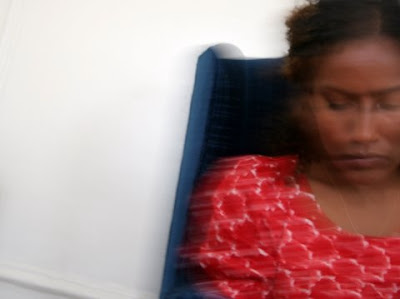
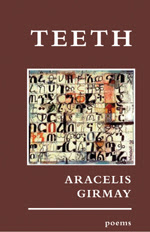 Aracelis Girmay writes poetry, fiction, & essays. Teeth, her collection of poems, was published by Curbstone Press in June 2007. Her poetry has appeared in Ploughshares, Bellevue Literary Review, Indiana Review, Callaloo, & MiPoesias, among other journals. Her collage-based picture book, changing, changing, was published by George Braziller in 2005. Girmay is a Cave Canem Fellow & former Watson Fellow. She teaches writing workshops in New York & California.
Aracelis Girmay writes poetry, fiction, & essays. Teeth, her collection of poems, was published by Curbstone Press in June 2007. Her poetry has appeared in Ploughshares, Bellevue Literary Review, Indiana Review, Callaloo, & MiPoesias, among other journals. Her collage-based picture book, changing, changing, was published by George Braziller in 2005. Girmay is a Cave Canem Fellow & former Watson Fellow. She teaches writing workshops in New York & California.
(That's the official bio, gente, but I think you'll love hearing Aracelis on Aracelis in a recent email I received.)
*****
"I've loved books & the idea of reading since I was little. The story goes "you used to memorize the books & sit & read from memory before you knew how to really read." I used to sleep with my books. I LOVED to read, and then, I used to tell my younger brother stories. My grandmother still has folders of stories I'd write at her house. When I was 13, though, I read The Bluest Eye, I remember thinking: Oh, god, we're allowed to write like that? The way we think? The way people talk? The ways my people talk? Oh, really? It opened up this door of permission---I didn't know, really, that writing could represent me, not until then. wow, something in the way that I perceived writing & reading changed in me then.
I started sharing my work with other people when I was in college--Writing has always been my lifeline--my way of figuring & making sense & asking questions & maintaining hope, a hope. But it wasn't until college that I realized that I HAD to cultivate this work--that I HAVE to write. It is one of my absolute necessaries. Circulation, breath, communication, memory, wildness, & order. My mom is Puerto Rican & African American (Georgian)--from Chicago, & my dad's Eritrean, born in Gondar, Ethiopia. Both of them are amazing story-tellers--who tell the stories in very different ways. But, oh! The stories--they are essential--I always had the sense (even when I was very small) that these stories would be the only landscapes in which I'd meet, say, my Great Aunt Tiny, my uncle Samuel, my grandparents, my countries.
I knew, too, that the stories were not only important for me & my brother to hear (my sisters weren't born yet), but for my parents to say out loud. I remember witnessing the powers a story can have on the person telling--the way connections that weren't made before can be made in the telling. I write because it is my way of speaking, my way of figuring, my way of connecting, moving deeper into my life. I write, too, in the words of Carolyn Forche: against forgetting. I write the things that others wish I would forget. The things I cannot bear forgetting. The things I cannot survive forgetting. I write to get something back: world, that is, to still myself, somehow, & consider the things the world is constantly showing: see, see this! hear, hear this! say this! remember, remember!
I write to undo time, to go back & fiddle, to sit with what I've been given, to learn something, really, to visit the ghosts & let them know I see them.
Influences--poets, fictionists, painters, musicians: Helene Cixous, Aime Cesaire, Audre Lorde, Gabriel Garcia Marquez, Toni Morrison, Frida Kahlo, Martín Espada, Gwendolyn Brooks, Nazim Hikmet, Anna Akhmatova, Ovid, Etta James, Derek Walcott, Naomi Shihab Nye, Cy Twombly, Lucille Clifton, Caetano Veloso, Pharoah Sanders, Taha Muhammad Ali, James Tate, my students, a few of Hayden Carruth's poems knock me out--hugely, church stories, my family's stories, my parents, my family's dead; and every accordion: every accordion is my influence."
*****
And if you haven't already fallen in love with her and her writing, take a look at what others have to say about the Divine Ms. Girmay.
"In Teeth, the poems of Aracelis Girmay ring out with a burning truth as she transports the reader into the world of despair, discrimination, sorrows, triumphs, joy and the courage it takes to flourish as a woman of color. Her keen observations are put forth with an appetite for life without fear or self-consciousness as she weaves her words into a range of potent poems." -- Nicholasa Mohr
"The poetry of Aracelis Girmay is so strong, so brave, so lyrical, so fiery, so joyful, that the usual superlatives fail. I think of Sandra Cisneros and her words of praise for another writer, Denise Chávez: 'I love this book so much, it sounds like I’m lying.' Exactly." -- Martín Espada
"In the foreword, [Espada] calls the poems, 'hard, cutting, brilliant, beautiful.' As I read Teeth, I have to say that it did not take long for me to agree with [his] opinion. But more than that, I have to say that Girmay has put together one of the best debuts by any poet in recent memory...This collection is sure to continue to create a significant amount of well-deserved buzz. No doubt it will garner more praise and will be mentioned among nominees for literary awards. Indeed, Aracelis Girmay is the real deal."-- Jose B. Gonzalez, Co-Editor of Latino Boom
"In her powerful debut collection of poems, Teeth, Aracelis Girmay reaches out to her various cultural lineages (Eritrean, Puerto Rican and African American) and weaves them into a distinct voice, political and beautiful as 'bullets of ivory'...Teeth delivers on its promise to be a fierce, proud book of poems that provokes thought and invites its readers to be a poet's unique and expectant universe, where celebration and protest, lament and solace, sound and silence, intertwine and thrive."-- El Paso Times
Aracelis Girmay makes me want to be a better writer. TEETH is a stunning piece of work de sudor y socorro. She has the gift -- able to craft indelible work fashioned from the bones of ancestors and living, singing blood. Girmay's been blessed to be mentored by Martín Espada but make no mistake, her voice is wholly and fully her own, as is her subject matter. Her mastery of poetic form and an almost ruthless, heartbreaking beauty is shot through this unforgettable volume. Like Espada, she seamlessly fuses the personal and political, revealing where the wounds lie. And Girmay always, always, returns to the indomitable, unquenchable spirit that saves even the most disadvantaged, the most abused from being mere victims. She is also brave enough, wise enough to show her heart in love and at play.
But the social power of this book is never diluted At its essence, TEETH reminds me of a passage in Maxine Hong Kingston's The Woman Warrior. A young woman, a peasant girl, has completed her training to become a soldier, the means by which her family and her village will seek justice against the overlord. With a whisper-thin blade, her parents inscribe the history of abuse which all of them have suffered. The girl's back becomes her eternal oath, a record laid into the flesh, but it is never reduced to a scar.
ARROZ POETICA
I got news yesterday
from a friend of mine
that all people against the war should
send a bag of rice to George Bush,
& on the bag we should write,
“If your enemies are hungry, feed them.”
But to be perfectly clear,
my enemies are not hungry.
They are not standing in lines
for food, or stretching rations,
or waiting at the airports
to claim the pieces
of the bodies of their dead.
My enemies ride jets to parties.
They are not tied up in pens
in Guantanamo Bay. They are not
young children throwing rocks. My enemies eat
meats & vegetables at tables
in white houses where candles blaze, cast
shadows of crosses, & flowers.
They wear ball gowns & suits & rings
to talk of war in neat & folded languages
that will not stain their formal dinner clothes
or tousle their hair. They use words like “casualties”
to speak of murder. They are not stripped down to skin
& made to stand barefoot in the cold or hot.
They do not lose their children to this war.
They do not lose their houses & their streets. They do not
come home to find their lamps broken.
They do not ever come home to find their families murdered
or disappeared or guns put at their faces.
Their children are not made to walk
a field of mines, exploding.
This is no wedding.
This is no feast.
I will not send George Bush rice, worked for rice
from my own kitchen
where it sits in a glass jar & I am transfixed
by the thousands of beautiful pieces
like a watcher at some homemade & dry
aquarium of grains, while the radio calls out
the local names of 2,000
US soldiers counted dead since March.
&, we all know it, there will always be more than
what’s been counted. They will not say the names
of an Iraqi family trying to pass a checkpoint
in an old white van. A teenager caught out on some road
after curfew. The radio will go on, shouting
the names &, I promise you,
they will not call your name, Hassna
Ali Sabah, age 30, killed by a missile in Al-Bassra, or you,
Ibrahim Al-Yussuf, or the sons of Sa’id Shahish
on a farm outside of Baghdad, or Ibrahim, age 12,
as if your blood were any less red, as if the skins
that melted were any less skin, & the bones
that broke were any less bone,
as if your eradication were any less absolute, any less
eradication from this earth where you were
not a president or a military soldier.
& you will not ever walk home
again, or smell your mother’s hair again,
or shake the date palm tree
or smell the sea
or hear the people singing at your wedding
or become old
or dream or breathe, or even pray or whistle,
& your tongue will be all gone or useless
& it will not ever say again or ask a question,
you, who were birthed once, & given milk,
& given names that mean: she is born at night,
happy, favorite daughter,
morning, heart, father of
a multitude.
Your name, I will have noticed
on a list collected by an Iraqi census of the dead,
because your name is the name of my own brother,
because your name is the Tigrinya word for “tomorrow,”
because all my life I have wanted a farm,
because my students are 12, because I remember
when my sisters were 12. & I will not
have ever seen your eyes, & you will not
have ever seen my eyes
or the eyes of the ones who dropped the missiles,
or the eyes of the ones who ordered the missiles,
& the missiles have no eyes. You had no chance,
the way they fell on avenues & farms
& clocks & schoolchildren. There was no place for you
& so you burned. A bag of rice will not bring you back.
A poem cannot bring you. & although it is my promise here
to try to open every one of my windows, I cannot
imagine the intimacy with which
a life leaves its body, even then,
in detonation, when the skull is burst,
& the body’s country of indivisible organs
flames into the everything. & even in
that quick departure as the life rushes on,
headlong or backwards, there must, must
be some singing as the hand waves “be well”
to its other hand, goodbye;
& the ear belongs to the field now.
& we cannot separate the roof from the heart
from the trees that were there, standing.
& so it is, when I say “night,”
it is your name I am calling,
when I say “field,”
your thousand, thousand names,
your million names.
IN THE CANE FIELDS
You are a steel-blade woman,
I am a steel-blade man.
When we dance like this,
head-high in the cane,
my heart beats red with want.
It’s a dangerous taste
gonna swing me from some hanging tree.
I am a steel-blade woman.
You are a steel-blade man.
If the Boss Men follow
down the dirt red road,
accuse us of blackness & of love,
let us live again, sweet,
come back & haunt these fields.
FOR ESTEFANI LORA, THIRD GRADE, WHO MADE ME A CARD
for Estefani Lora, PS 132, Washington Heights
*
Elephant on an orange line, underneath a yellow circle
meaning sun.
6 green, vertical lines, with color all from the top
meaning flowers.
*
The first time I peel back the 5 squares of Scotch tape,
unfold the crooked-crease fold of art class paper,
I am in my living room.
It is June.
Inside of the card, there is one long word, & then
Estefani’s name:
Loisfoeribari
Estefani Lora
*
Loisfoeribari?
*
Loisfoeribari: The scientific, Latinate way of saying hibiscus.
*
Loisforeribari: A direction, as in: Are you going
North? South? East? West? Loisfoeribari?
*
I try, over & over, to read the word out loud.
Loisfoeribari. LoISFOeribari.
LoiSFOEribari. LoisFOERibARI.
*
What is this word?
I imagine using it in sentences like,
“Man, I have to go back to the house,
I forgot my Loisfoeribari.”
or
“There’s nothing better than rain, hot rain,
open windows with music, & a tall glass
of Loisfoeribari.”
or
“How are we getting to Pittsburgh?
Should we drive or take the Loisfoeribari?”
*
I have lived 4 minutes with this word not knowing
what it means.
*
It is the end of the year. I consider writing my student,
Estefani Lora, a letter that goes:
To The BRILLIANT Estefani Lora!
Hola, querida, I hope that you are well. I’ve just opened the card that you made me, and it is beautiful. I really love the way you filled the sky with birds. I believe that you are chula, chulita, and super fly! Yes, the card is beautiful. I only have one question for you. What does the word ‘Loisfoeribari’ mean?
*
I try the word again.
Loisfoeribari.
Loisfoeribari.
Loisfoeribari.
*
I try the word in Spanish.
Loisfoeribari
Lo-ees-fo-eh-dee-bah-dee
Lo-ees-fo-eh-dee-bah-dee
& then, slowly,
Lo is fo e ri bari
Lo is fo eribari
*
love is for everybody
love is for every every body love
love love everybody love
everybody love love
is love everybody
everybody is love
love love for love
for everybody
for love is everybody
love is forevery
love is forevery body
love love love for body
love body body is love
love is body every body is love
is every love
for every love is love
for love everybody love love
love love for everybody
loveisforeverybody
Last words on TEETH ---
Sigh. Sigh Again. Glorious. Go. Buy. The. Book.
ISBN 978-1-931896-36-8
*****
Un Abrazo a Julia Alvarez!
Sister Chicas gets a fantastic mention in Julia Alvarez' Once Upon A Quinceañera. We were completely bowled over to find that Julia had written a glowing paragraph about our book on page 48, as well as listing us in the reading guide! The project continues to be blessed and we are all so grateful for the kind words and the support.
Lisa Alvarado
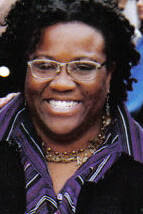
Jane Alberdeston Coralin is a Puerto Rican poet whose work has been published in literary magazines and poetry anthologies throughout the U.S. and Canada. An alumna of Cave Canem, a writers' organization for poets of African descent, Jane has performed her work in arts events and mentored writer's workshops in schools throughout the East Coast. Her poetry collections, Waters of My Thirst and The AfroTaina Dreams, are still in circulation. She is currently working on a poetry manuscript called Songs of a Daughter's Make Believe. She just completed her doctoral studies in English at Binghamton University in NY.
My blessing in knowing her is I have come in contact with poetry of heartbreaking beauty, but in addition, she is another co-author of Sister Chicas. Her Taina is self aware, whip smart and a deep dreamer, just like Jane herself.
xxxxxxxxxxxxxxxxxxxxxxxxxxxxxx
Describe your odyssey in becoming a writer. How does Latin and female identity influence your work? What would you say are your major influences, both personally and in a literary sense?It's wonderful how you begin with the word "odyssey"; most of the time it's felt like I've been on Discovery Channel's "Deadliest Catch" crab boat, rolling on the waves wishing for a full net. It's a type of wishing that happens with me too, a wishing for what I think is the right word, the best image, the loud line that will carry the story forward.
I am the cliche: the writer that started way-back, fourteen and pimply and unpopular. I had one friend, also a closet writer. We started writing Harlequinesque romances together. Lots of boys and horses. Only later, at eighteen, depressed and lonely in Long Island, far away from my mami and her Puerto Rico, did I learn to write truly, as in about my life, the things I understood and knew. And I could only get to that point through the vehicle of poetry. But I was a language novice; though I viscerally understood poetry's power, I hadn't yet grasped all the tools, the glorious avenues that poetry drives.
So, again, I floated on the waters, till I arrived in Washington DC and was warmly welcomed by the poetry community. I started reading at a dive called 15 Minutes on 15th Steet NW DC. A long Amtrak train ride waited me at the end of that night, but I knew it was the only way I could get to know people and kill the shy girl within. Monday nights I was there, sipping back Sprites with lime, scratching through wrinkles sheets of poem, waiting to be called on stage. Later, I found my community at It's Your Mug, a poetry cafe in Georgetown on P Street NW in the 90's. Imagine a room so filled with people it was warm in the winter, as if a hearth were burning in the corner. But there was so fire except for the flames coming out of some of the most political and dramatic poetry in the city. And the poets got me - they got my images, they got my song - they appreciated my life living on the fence, on the cusp of self: Americanness, blackness and Puerto Ricanness. I didn't see myself as a prism, but as a broken thing.
This was my new story to tell; not because it was hip or cool in 1995 to Latina in DC. This was my story to tell because I'd come to a point where my Latinaness and Blackness were speaking to each other. Narratives in my family long buried were suddenly crawling their way up and out of me. I heard my grandmother in Julia de Burgos's "Rio Grande de Loiza". Poems from Martin Espada, Marjorie Agosin, Judith Ortiz Cofer, and others were guides for me to move into the cave where the stories hide.
You were an established poet for quite a while before you stated writing fiction? Is the creative process different for you when you work in different genres? How so?
Oh, I was always a fiction writer; I think I stored the fiction away for awhile, boxed it up in cardboard boxes. I was afraid. Fear's so powerful, it struck my down for awhile. The poems were easier to admit were mine. Even that took years. It took for a very long time to say I was a writer, so your question throws me off the fence a bit. I kept poetry and fiction in very different camps: poetry to the far left, fiction over the hill and through the woods. I couldn't imagine their sharing space in my head at the same time. That would have meant I had grown as a writer! We can't have any of that.
Talking about fear, it was excruciating for me to imagine people would care about what I had to say. Shy for most of my life, I used poetry as the vehicle to talk. The poem would say everything I needed it to say and it would also silence what needed silencing. It's still very difficult for me to speak up, to say what I want, what I don't want or feel comfortable with. It's a constant battle for me: performing poetry became a stage where I could practice being heard. When I read a poem (mine or another's), I am amazed by how I feel as if the woman talking were from Mars or Pluto, blue with ice. So, if by established, you mean comfortable, I'd have to say NO. I'm never comfortable. But I'm still working - there's so much I still need to learn and try. I'm always oscillating between jumping off the cliff and never writing again or loving the process so much I'd marry it, as my 11 year old nephew would say.
Part of what keeps me going is the challenge: I become so enamoured of other writers' works: Edwige Danticat, Lucille Clifton, ZZ Packer, Zora Neal Hurston, my fellow artists and friends. Right now I am reading Kiran Desai and it was enough to strike me dumb for a bit. I couldn't think of creating for a couple of weeks. And then... something, as usual, popped in my head, deep in it, like a blooming cereus in the desert night. And then all was/is well. I feel/felt right with the world. Stumbling this practiced way is the only way I have of staying in love with process, thickening with it.
What's coming down the pike? For the past three or so years, I've worked to meld poetry and fiction, to blur the lines. I believe muddling the genres can help you strengthen the muscles for both. For example, in my own work, my dialogue in fiction stopped being stale and my poem-spaces have grown. I tell my students to listen in elevators, on the street, in restaurants. People don't know they way they speak is poetry. I use this exercise myself, fixing my ears to this magic has helped me hone in on my own work and shape it. I listen more to people, especially children. Their sounds and word choices, image constructions are so musical and poem-perfect. Children carry in their little mouths the very best metaphors. They have an intricate relationship with the power of image. They aren't held back by what keeps us, even writers, from say what needs to be said. They aren't full of the flowery language, yet they are such glorious gardens.
What would you describe as your major themes?Do you have enough room? My poems explored my race and nationality; they interrogated my father and his abandoning my family; they looked at migration and the grasp of one's culture over assimilation. In one of the poems I sent you, "Smoke", I was dealing with the idea of my father's depression, something I had never in my youth or early adulthood even thought to explore. But being able to look back with twenty-thirty sight, I can deconstruct my memories, see my father staring out a lot, having several afternoon drinks till he fell to sleep at night, bark at us though we'd done nothing to inspire ire. His beer-thick fog of unhappiness started to speak up, some fifteen years after he'd left us. It started to speak up in poems, interrupt rooms of poems, move through my writing like a bull in a porcelain shop. I could not ignore its chatter, its rumble. It's this way with most of my work, the stories too. Characters (whether in a stanza or paragraph) just won't leave me alone. The only way I have of shaking them off my back is to pay attention. Close. Jot down what the monsters say when they say it. Then I'm free. Somewhat.
Right now I'm interested in discussing womanist themes and spirituality. The women's voices tapping on my head like clockwork hammers come from the abused, stolen, disregarded. The spiritual element comes from our response, the way we use our stories to protect each other, to protect our children. I've been exploring this in my critical studies, but like everything in my life, the academic has arced into my creative work. And that has awoken memories of my Abuelita's storytelling. Or maybe the stories are the reason behind my academic studies? We all have "talking" memories; if not from an Abuela, then an Abuelo, or a Tia or Uncle or a Madrina sitting the kitchen, the porch, the stoop, or garden. Have you read Judith Ortiz Cofer's memoir Silent Dancing? When I read it, I was convinced she was talking about my Abuela Juanita. I could have leaned in and touched my own grandmother between those pages. I don't have many pictures in my head from when I was young. I wish I'd listen more, listened closer. A lot of what's inside my throbbing cerebrum is part photo-memory, adopted copies of those yellowing Kodak snapshots. One is clear: I was twelve and on my first period and it was my grandmother, sitting queen-like in the dining room, telling me how to stay away from boys. All that story wrapped up in her own carefully detailed narrative and the threads of a Bible story, full of suspense and worry, a story to scare the adventure out of a girl. I can see her now, her honey-glow skin, gold rimmed glasses, a black woman with a roman nose - the only thing she had left of her mother who died roasting coffee beans in a ramshackle house in Anasco, Puerto Rico.
Though for the past two years I fought against the confessional or personal narrative in my poems and looked at the universal, I have learned from the literary great Audre Lorde that those dichotomies come together beautifully in the end. I don't fight the onslaught anymore. And there is an onslaught: I have the good fortune to have my mother with me; she, the last repository of all the lost tales, and I are working to piece my grandparents' stories together. Why? I want my nephew to have this history, a history which has been part of my construction and is part of his.
Is there a particular spiritual practice that informs your work? If so, can your share its importance?I don't generally speak about my spiritual choices, but I will say that my writing is a spiritual process. Years ago, in Mexico City, I became friends with a devotee of a Hindu guru named Satya Sai Baba. My friend made annual pilgrimages to Calcutta and then returned from her retreats full of stories. Her eyes would glass over as she talked about lingams and divine ash and the Ganges sitting behind her in the sun like a forever ribbon of silvery skin. Her breath even smelled of incense, her hands at her heart as she spoke. She was contagious. I could not go to India but I had India in her. And felt God in that exchange. This is to say that I do my best to find God in everything and that I attempt to take, not only into my work, but into my everyday.
It's not so easy; I fail often, so I meditate. I have always been struck by how the creative experience is so closely related to meditation. If I am doing it right and am immersed soulfully in the act of creating, whether it be a drawing, a poem, or a story, I lose the busy, noisy, encumbered world around me. It is as if the walls fall away. And yet, I also become full of the world: the world that suffers, that is joyous, that breathes and dies. I feel open to energies not readily available in the hustle of a normal day. I am raw and vulnerable, but not vulnerable to danger, but open to love, immeasurable. I struggle to maintain that level of "meditation" when I write, even when I am uninspired. Inspiration is everywhere. I remind my students of this, while reminding myself.
I feel most animal when I write or draw. It is not art at that moment, not full of the pretense and arrogance that divides the creation from the world. In that moment, there's something metal in my mouth and I am full of air, as if I were a helium balloon. That is the texture of the experience. It is harder to explain the emotion behind it. Can I say I feel connected to the Divine?
What would you describe as your core strengths as a writer....where would you like to see yourself grow?I enjoy the way I fall in love with the playfulness of language. My grandmother died when I was twenty-one. I had pretty much grown up with her, so when she died, I lost a limb, a living and loving part of my life. I had a hard time understanding that loss and stopped taking care of myself, grew angry with the world. But while sunk deep into depression, eating potato chips and watching soaps all day, I did write. Cringing angry poems crouching in the dark. Horror stories full of dead people. I experimented with electricity, making words into lightning rods burning up the page. It was the most creative period of my life -- so far. My mother worried - I must have looked a little scary; so she enrolled me back in college. I was exceedingly proud of the first paper I wrote for my composition class. My professor was cute. People talked to me. Life was getting better. Then -- my essay slipped from my teacher's hands into mine, like a grenade, a fat shame bomb. He'd written in red screaming pen, wide across the page like a banner: TOO FLOWERY. I was crushed. My writing life, my life, was over. I dragged myself to his office, blubbering, eyes swollen, embarrassed. Luckily, he wasn't there. It took two classtimes for me to summon up the courage to tell him what I felt without breaking apart at the seams. In the end, his response was that I was a good writer and just needed to practice. From there on in, that's what I've been doing: practicing.
I do my best to stretch the arms of words, to double, triple, quadruple their meanings and possibilities. I do tend to get away from myself (admittedly, even here). It takes several revision sessions to rein myself back in. This year I 'm going to work on a graphic novel project. This project will force me to control my elaborate, curlique way of expanding text. I will need, unlike my responses to your questions, to keep the **** short. And yet there's something very Juanita (and a little like my mother) that lets me ride the tangent wave that leads me to story. I'm going to go with it - it's worked for me so far.
We collaborated in writing Sister Chicas... how would you describe the impact in crafting a novel in that way?The impact has been indescribable. I namely became friends with two talented writers. I learned from Ann Cardinal how to make a character pop through their language. Where my characters have the poet-voice in them, obscure, quiet, a little consumed, hers explode! They take on the page like war - they are full of talk and dragon. I love her gorgeous way of making her characters stand out: veined, real, blood people. From you, Lisa, I watched scenes unroll. You write like film. My eyes can follow and swallow each moment as if I were living it myself. Also, I learned to appreciate the art of editing, your precision and care. Thanks to our connecting, I finished with my adolescence! I still can't believe it was one phone call that brought Taina, Graciel and Leni out from the wood. This can only be exemplary of how the universe brings us to certain situations and places so that we'll learn. It is the Divine at work. From girl to woman, I believe I grew into a careful writer, watching around bends and corners for missteps in continuity. Like Taina, I learned to walk in heels. I couldn't have gained that experience anywhere, except through the pearl of our collaboration.
Years ago, a poet friend talked to me about credos. I didn't have one. It was the Sister Chicas project that helped me earn a credo, a belief in what I mean when I say I'm a writer. I learned more about myself in that encounter, in that sharing, than I ever had before: the dangers between what is friendship and business. I learned about responsibility to another and loyalty to one's art, to one's message.
How would you describe your ties to family and place as it relates to your creative life?My family, living and dead, is extremely important to me, first as person who needs love and validation. Secondly, as a writer, they provide for me a vast landscape of memory. You got a truck load of those earlier in this interview. Though some places of that valley that is the past are unreachable, it is my family that reminds me that I am part of that story. Even those who've gone (whether by choice or not) are a section of the weave of that fabric. There is nothing I can extract or throw away. Even the ties broken by my father are vital to who I am and what I tell. His absence, though no longer painful, is still part of my experience as a woman. I no longer live on the island I write about. Does that mean I am disassociated from the oily mangroves or the cliffsides dipping into the ocean or the lovely stuck roasting pigs lining the dusty highways? I am only slightly bereft; my heart and mind make up what is not there. Memory is such a spirit that it is voice and it is blood. I can call it Latina, like I can name it African diaspora, like I can say it's female. But truly what I am is a construction of stories: island, mainland, back street, city, country, suburb, military base, coffin, nursery. I am part of that language, that text.
Where do you see yourself in ten years, personally and creatively?
I believe that wherever I am creatively is where I'll be personally. I recently received my doctoral degree in English literature from Binghamton University. When people ask me what I took from the experience, there is only one thought bursting in my mind: I spent five years writing. I woke thinking of what I wrote before sleep. I went to sleep thinking of what I wrote during lunch. Or thinking of what my students wrote. Or what they wanted to write. I have been very fortunate to have been given the time, the funds, the fellowship and the space. Who else can say that? Whatever I do, whether it involves driving a cab (which I would be horrible at) or teaching in a classroom, I hope I continue exploring those disconsolate, buzzing, ecstatic voices within, bubbling at my seams, ready to spread their words.
What's something not in the official bio? I got MAD Nintendo skills. Well, not really. Recently, I beat my brilliant and talented nephew at a game and not being techinically-inclined in any way or fashion, it felt pretty good. I was never really sporty either - though I had the Adidas with the side green stripe and the Members Only jacket (are there still members or have they been excommunicated?) I was so bad at sports that I became a cheerleader. Shy girl - a cheeerleader - a really bad cheerleader. After a cheer, I usually ended up facing the wrong way. I never really got the hang of the round-the-world thing, one time landing a foot in a pothole and chipping a bone in my ankle; another time, slipping into an ant hill. The ants weren't thrilled, believe me. I guess it was another reason, other than being clinically poor at Mathematics, I became a writer. I think I made the right choice.
xxxxxxxxxxxxxxxxxxxxxxxxxxxxxx
River Silk: A Song for Maria
She was mined from the mouths of worms, centuries gathered,
then crated cross oceans to Paterson, that bustling city where she plaited
her mother's hair, and her father's skin shone between the shadows
of the Royal Machine Shop. In her bobby socks and poodle skirts,
she was just a young girl reeling in the dream of cornsilk.
All she knew breathed in Paterson's gills,
the worlds between PS 18 and the 17th Street
kitchen, Meyers Brothers and the pulp of rotting
marigolds on neighbor's stoops.
She grew to understand power plants and fish weirs,
a city's promises and the legs of a father's labor.
She read a rivertown's desire, once prehistoric and big as God,
now skeletal, its ribs surrounding a whole city of dollar stores.
Long gone are the ship odors of jasmine. Now it's the pulse of car horns
and chickenwire that greet her, the tricks of a church spires' reach,
the wintergreen songs of silk wrapped around women's throats.
But still she tells the world of Paterson's sweetwaters,
new immigrants of alcapurrias, their children that rise then fall and rise again,
and those with faces like her Papa's.
On the days she is not boro or back bay or northwest bend,
the hours she is the quiet New Jersey drought, she stays put,
near home, weaving ribbons. She is the lips of the Passaic, weaving through iron,
stone to lowland swamp, but words are not all she looms in that bustling city.
Find her in drainage ditches, in the wet tongues of Clifton's suburban curbsides,
near Spruce Street or Ward, floating down Pennington Park, a lined paper boat,
winding, climbing, navigating the dead to safety. I swear that if you lose her,
all you have to do is knock on leaning oaks, or smoke out of a cave.
Her words wings in the underworld that is the gut. If you look close,
it is love's fibers she threads, wide and emergent with all her strokes,
dancing in rooms reserved for slowness.
Kneel, go ahead, just kneel
to the ground, listen close to the Passaic passing by
on the errand of her heart.
_________________________________________
Smoke
Your father turns the rib-eye on the grill. In a few days he'll leave home
for field duty. You watch him get lost in the puff of new smoke.
It is like flipping a record over after the last song:
He slips his fingers on the vinyl, scratched and worn,
skating the dark circle. He does not know
his wife will thin the night and the linoleum
in a slow dance made for two.
In a weekend ritual, he bends over those old album covers:
Cash, Waylon, Campbell, their liquor red-eye and his.
Their superstar cowboy brims, your daddy’s boonie hat,
their throats cut with gold and diamonds,
around your father’s neck a noose dragging a dog-tag.
"� cow-boy, dun-dun", your father sings,
the chorus of fallen leaves crackling in the drainage ditch.
You wave away smoke to get a good look at him.
He smiles and you worry when he does it with all his teeth exposed.
It’s the kind of grin reserved for beer and barbecue and Sundays.
You try to sing along too to something rhinestone
but you get the words wrong. Your Papi lights up,
a tobacco puff blows your way, fragrant like cinnamon.
He does not look at you; instead, he looks around
at everything he’ll never own, though he signed for it.
Daughters and scraps of credit and memory. Children,
cornhusks blocking out his sky. Five mouths and a broken dial
on the pawn shop Sanyo. All he gets now is snow
in someone’s coal miner daughter.
Give him room, a cloud of smoke whispers, tells you to go away,
let your Papi do his thing. The smoke collars him, turns his hair white.
There’s a devil in the next track. You know what comes next.
He’s listening for clues, even in the scratches.
He is far gone, already turned to a secret B side, tuned to a twang
you cannot hear, blue forest floors in his eyes,
all the backcountry of his mind. The ditches he’ll dig,
holes he’ll slip into. You’ll always wonder
if all the voices that called were in his mother’s tongue
or if they carried all the dusts of Clarksville.
Finney, Nikki, ed. The Ringing Ear: Black Poets Lean South, Univ. of Georgia Press, 2007
__________________________________________
Papi and his Chrysler Cordoba
In his eyes, you could see a salesman's bounty.
Every time Papi looked at his Cordoba
you knew he knew it was not meant to be a family car
but a car for the left lane, with the window down,
with dashboard dice over the grey plush exterior winking back
at the ladies passing, peering in, as if they couldn't get enough of
My Papi, who always waited until it was the hottest hour of Saturday
to wash his Mami. He made it a holy act, a Sabbath ritual, a cup of overflowing
burgundy, felpa and Turtle wax, so shiny, it reflected back his face in the sun.
This was how he relaxed, never asking for help, all puffed up,
shirt front wet with the whipping hose, suds in his lashes,
as if a rainbow had kissed his eyes. Proud Papi
of the Chrysler Cordoba with the silver and gold siderails,
and the Chrysler insignia bent sideways on the hood from the time
he hit the bicyclist who looked the other way.
It never mattered to him that his back bent the same,
a brace to hold a slipped disc, incurred falling off an assault tank
the way Icarus thudded back to earth,
all melted wax and white feathers, body broken like a pigeon's heart.
Papi's too was like that, maroon and mystical, like the surface of
a summertime lake, sparkling with the loosed oil of drowned cars.
xxxxxxxxxxxxxxxxxxxxxxxxxxxxxx
In ending this article, I have to say a few words about Jane's poetry. There is such longing, such braiding to familia, even if the price is heartache. There is too, a sense of heroism, of dignity in the face of loss, and a profound sense of ordinary beauty in both the construction of her work and the lyrical images that are shot through it.
Lisa Alvarado
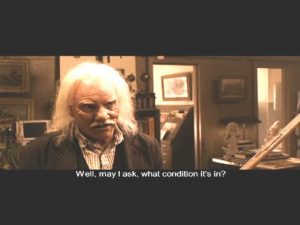
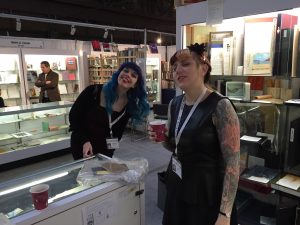
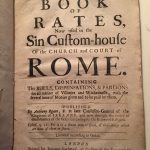
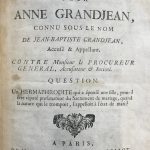
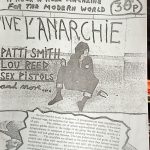
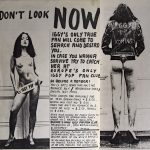
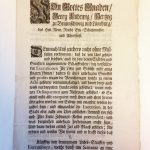
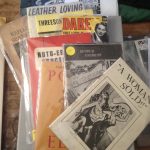

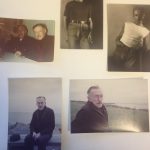
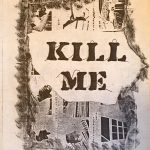
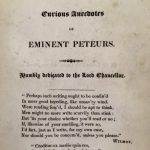
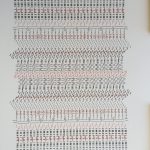
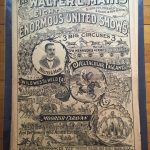



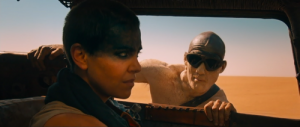

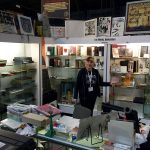
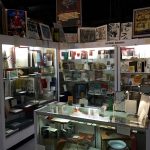
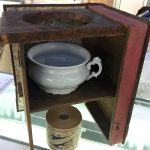
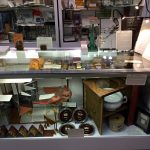
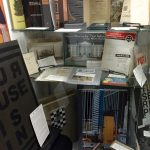
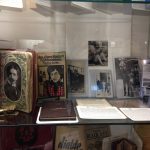
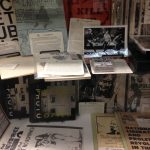
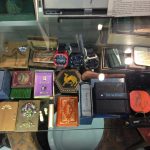
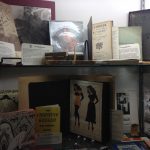
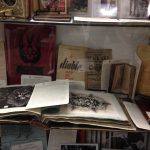
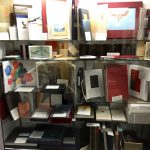

















Ian, many congratulations! Well-deserved indeed. (And I hope you feel better soon).
Best,
Jeremy
Congrats on becoming an ABAA member! I hope it brings you lots of new clients and sales.
I thought you were already an ABAA member. You have certainly exhibited the integrity and quality inventory I've come to know from ABAA members in the short time I've known you.
I hope you get better soon!
- Nathan
congratulations. hope it brings you lots of clients.
I've said from the beginning that you were destined to be the next A.S.W. Rosenbach - so I view your election to ABAA as a necessary and essential step in your plan for (book) world domination.
But seriously, all the best, Ian - your love of books and your integrity both shine forth from you! Also a bit of wickedness, but hey, we don't have to go into that today.
:O)
Congratulations, Ian! Looking forward to seeing you at the ABAA shows.
-Jesse (U of D)
Well done, Ian. I'm sorry I missed meeting you at the SF Book Fair last week, as planned...I coulda said I knew you "back when"~before you got famous! Congratulations.
Jeanne